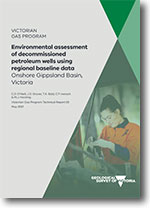VGP Technical Report 59 - Environmental assessment of decommissioned petroleum wells using regional baseline data, Onshore Gippsland Basin, Victoria.
 |
| |||||||||||||||
Product description:About the Victorian Gas Program: The Victorian Gas Program (VGP) is a comprehensive science-led program, incorporating geoscientific and environmental research to assess the risks, benefits and impacts of potential onshore conventional gas exploration and production. The program is also investigating the potential for further discoveries of onshore conventional and offshore gas in the Otway and Gippsland geological basins and assessing the feasibility of additional onshore underground gas storage in depleted reservoirs around the Port Campbell area. The VGP includes an extensive, proactive and phased community and stakeholder engagement program, through which the results of the scientific studies are being communicated. Executive summary: An assessment of the environmental impacts of decommissioned petroleum wells across the onshore Gippsland Basin has been undertaken as part of the Victorian Gas Program’s (VGP) environmental studies. This report presents an assessment of the variation in environmental receptors proximal to decommissioned petroleum wells with the new regional-scale environmental baseline data collected as part of the VGP. Between June 2017 and June 2020, the Geological Survey of Victoria (GSV) conducted regional groundwater chemistry and atmospheric baseline studies in the onshore Gippsland Basin to determine current environmental conditions. These regional atmospheric and groundwater chemistry baseline datasets were analysed to determine any spatial correlation between decommissioned petroleum wells and variations in the measurements from these datasets. Regional atmospheric methane baseline measurements were analysed to determine any spatial correlation between decommissioned petroleum wells and areas of elevated atmospheric methane. The analysis showed that no atmospheric methane could be attributed to decommissioned petroleum wells, as atmospheric methane concentrations were equally likely to increase or decrease within five kilometres of a well. Regional groundwater chemistry baseline measurements were analysed to determine any spatial correlation between decommissioned petroleum wells and variations in groundwater chemistry, including major ions, trace elements, dissolved methane, ethane, and groundwater isotopes. Eight of the 22 monitoring bores sampled as part of the regional program were within two kilometres of a decommissioned petroleum well. One of the eight bores contained groundwater that was elevated in thermogenic methane. This bore was screened within the Latrobe aquifer, which can also act as a gas reservoir in the area. As such the methane was likely due to the natural migration in the area. In the remaining seven bores, no significant difference was observed between the groundwater chemistry in bores proximal to decommissioned petroleum wells and the regional baseline. Bibliographic reference: O’Neill, C.D., Grover, J.D., Bold, T.A., Iverach, C.P. & Hocking, M.J. 2021. Environmental assessment of decommissioned petroleum wells using regional baseline data, Onshore Gippsland Basin, Victoria. VGP Technical Report 59. Geological Survey of Victoria, Department of Jobs, Precincts and Regions, Melbourne, Victoria. Download: The downloadable version of this report is supplied in PDF format (8 MB). Related products:
| ||||||||||||||||


